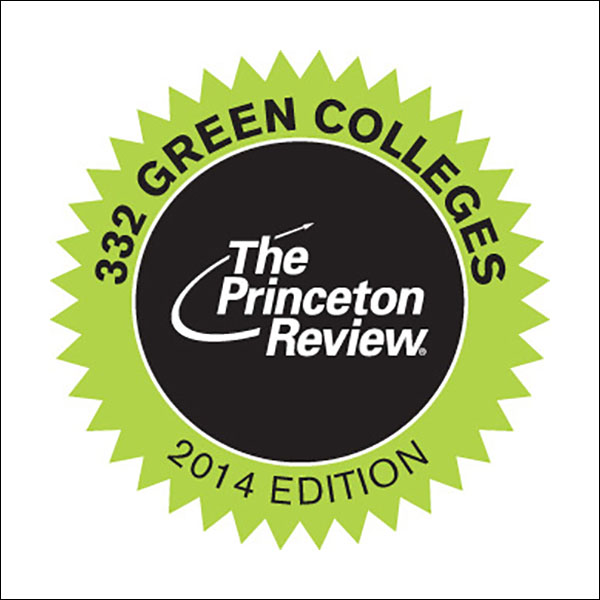BOONE — Appalachian State University is among the most environmentally responsible colleges listed in “The Princeton Review’s Guide to 332 Green Colleges: 2014 Edition.” The guide was created in collaboration with the Center for Green Schools at the U.S. Green Building Council (USGBC).
The 216-page guide profiles 330 schools in the U.S. and two in Canada that demonstrate exemplary commitments to sustainability in their academics, campus infrastructure, activities, and career preparation.
This is the fifth year the guidebook has been released and Appalachian has been included each time.
“Appalachian has a decades-long commitment to sustainability. We have faculty, staff and students who, for years, have come here to work or for an education and have, by default, brought these sustainability values with them,” said Ged Moody, Appalachian’s director of sustainability.
According to Rob Franek, senior vice president and publisher of The Princeton Review, 61 percent of college applicants who participated in The Princeton Review’s 2014 “College Hopes & Worries Survey” indicated that having information about a school’s commitment to the environment would influence their decision to apply to or attend the school.
“To all students seeking to study and live at ‘green’ colleges, we strongly recommend these schools,” Franek said.
Schools were included in the list based on sustainability-related policies, practices, and programs shared in a 2013 survey. Appalachian’s profile in the guide includes these points of pride:
- A university mission is to protect the environment through conscientious stewardship and assertive leadership in sustainable policies and practices
- 17 renewable energy installations on campus, including North Carolina’s largest installed wind turbine
- $3.25 million in energy cost savings in 2012-13
- Free mass transit, plus car sharing and ridesharing
- 275-ton composting capability at a state-of-the-art facility on campus
- A 369-acre teaching and research farm where students enhance their classroom lessons about agroecology, agroforestry and sustainable farming practices through experiential learning
- Undergraduate and graduate degree programs in sustainable development and appropriate technology that have been offered for more than 20 years
- More than 70 percent of departments offering sustainability-related and focused courses, totaling more than 20 percent of all courses offered
- Sustainability education as part of the university’s general education curriculum
- More than 40 sustainability-based clubs
- Nearly 50 percent of faculty engaged in research as it relates to sustainability
- Winner of the People’s Choice Award for its entry in the 2010 Department of Energy’s Solar Decathlon and selection to compete in Solar Decathlon Europe 2014.
Other recent points of pride are a No. 18 spot in Sierra magazine’s 2013 ranking of the nation’s “Coolest Schools” and inclusion among the 10 top universities recognized for energy reduction through the Campus Conservation Nationals 2014 contest.
In addition to Appalachian, other N.C. schools included in the guide are Catawba College, Davidson College, Duke University, Elon University, Guilford College, N.C. State University, UNC Chapel Hill, Warren Wilson College and Western Carolina University.
To download “The Princeton Review’s Guide to 332 Green Colleges: 2014 Edition,” visit http://www.princetonreview.com/green-guide.
What do you think?
Share your feedback on this story.
About Sustainability and Energy Management at App State
Appalachian State University’s leadership in sustainability is known nationally. The university’s holistic, three-branched approach considers sustainability economically, environmentally and equitably in relationship to the planet’s co-inhabitants. The university is an active steward of the state’s interconnected financial, cultural and natural resources and challenges students and others think critically and creatively about sustainability and what it means from the smallest individual action to the most broad-based applications. The university offers both undergraduate and graduate academic degree programs that focus on sustainability. In addition, 100 percent of Appalachian’s academic departments offer at least one sustainability course or course that includes sustainability, and all students graduate from programs that have adopted at least one sustainability learning outcome. Learn more at https://appstate.edu/sustainability.
About Appalachian State University
As a premier public institution, Appalachian State University prepares students to lead purposeful lives. App State is one of 17 campuses in the University of North Carolina System, with a national reputation for innovative teaching and opening access to a high-quality, cost-effective education. The university enrolls more than 21,000 students, has a low student-to-faculty ratio and offers more than 150 undergraduate and 80 graduate majors at its Boone and Hickory campuses and through App State Online. Learn more at https://www.appstate.edu.












